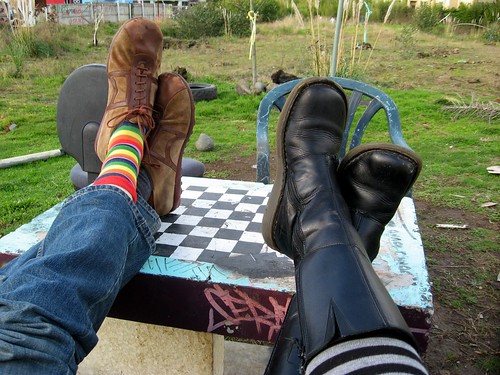The last time I caught a train from Auckland to Wellington it took all day and half the night. In the early nineties, you may recall, it was decided that the best way to make the trains in this country run on time was to sell them to a mob of shameless profiteers. The assumption was, I think, that if the railways were owned by companies who had no particular interest in maintaining them or investing in new infrastructure, we would end up with a state of the art rail network that would be the envy of the world. We shouldn't laugh - the decisions were made by policy-makers who cut their teeth in the eighties, remember, when governments everywhere were motivated by strange ideas. Ronald Regan, for example, wouldn't even get out of bed without consulting his astrologist. Here in New Zealand, our economic policy was mostly informed by a machine called the MONIAC, which modeled the domestic economy using a baffling system of water-filled tubes and counterweights. That mistakes were made in this environment is unsurprising to say the least.
What the MONIAC and the occultists who interpreted its gurglings failed to predict was that the company that eventually ended up owning what was left of the railway lines by the mid-2000s would try to increase its margins by firing the maintenance staff. Actually, maybe they did know that. It was fashionable for a while there for politicians to complain that as they rumbled along in their state-owned trains, they looked out the windows and saw all these guys leaning on shovels, not doing much work and generally representing a check on economic growth. I think privitisation was supposed to make the organisation leaner and meaner or something, removing all these make-weight layabouts from the payroll. It turned out that this might have been a case of selective perception - the maintenance workers were generally quite busy, but they weren't going to be doing very much with their shovels while the politicians were actually rolling past, because they would get hit by trains and die. This is kind of like a train driver wondering why all the level crossings in the country are closed all the time. Anyway, after ten or so years of Tranzrail's ownership, what with the asset-stripping, large-scale redundancies, and the massive reduction of investment in maintenance, the tracks were a mess. It sometimes took as much as fifteen hours to get from Auckland to Wellington, which is insane.

More selective perception: from a train, all the towns look like this.
That's why I had some misgivings about catching the train to Wellington last week to play a show in Paekakariki with Rosy Tin Teacaddy. Don't get me wrong - I love playing in Paekak, and I love playing with the Teacaddies, and I really love their new songs. Thing is, it sounds pretty romantic to catch a train to play a show, and just about every folk musician you talk to will tell you that they've got plans to do a tour of the main trunk line or something, but it can be a bit of a pain. I mean, you spend all day traveling, and then you wind up in a railway station with about half a ton of gear. Profit-driven delays on top of this is just adding insult to inconvenience. As it turned out last week, though, catching the train from Auckland to Wellington is quite a lot of fun these days if you're in good company and the weather is nice. Ms. Millicent Crow was plying her wares at Craft Country Wairarapa in Greytown on the Saturday, and I had the Paekak show on the Friday, so we put on our best traveling outfits and escorted one another on a Grand Day Out.

They didn't actually let me drive. But they did let me pretend to drive, which is basically all you can do with a train anyway.

There's a balcony now! But they won't stop if your hat gets blown off.
The main thing that's changed since last time I caught that train is that now I own a part of it again, so it's working a whole lot better. A few years ago, the government bowed to pressure from just about everybody, and admitted that maybe the MONIAC crew had made a mistake - actually, private companies don't seem to be that good at making trains run on time at all. They admitted that yes, this was embarrassing, but they did the decent thing and renationalised the whole show. Now it's actually quite lovely, and not at all like a train in, say, North Korea or 1970s Poland. It turns out that state ownership does not have to be highly correlated with surly train guards, back-breaking seats, and salmonellous dining options. In this case, we had things like leg-room, reasonably priced and quite tasty refreshments, and a pleasant stop at National Park so we could take photos of trucks. And, although I hate to belabour the point, it was even on time.

Mountains, a tractor: what more could you want?


